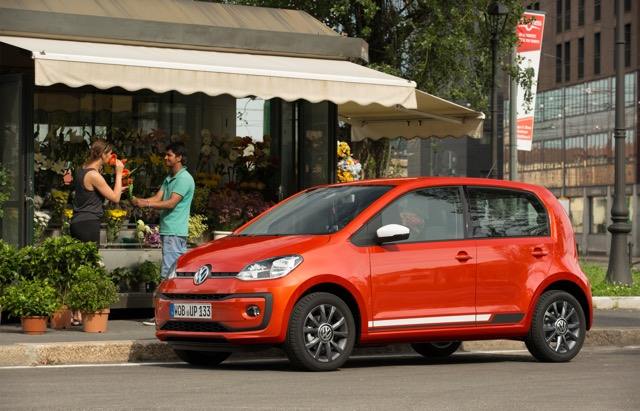Search the Community
Showing results for tags 'small displacement engines'.
-

Volkswagen Believes Engine Downsize Trend Is Coming To A Close
William Maley posted an article in Volkswagen
Automakers have been downsizing their engines and adding turbochargers to improve fuel economy while retaining power from larger displacement engines. But is there a point where this trend doesn't make sense anymore? Volkswagen believes that time is coming very soon. "The trend of downsizing is over," said Herbert Diess, Volkswagen's chairman. "Emissions tend to go up as engines get smaller." This is due to smaller engines needing to work much harder to produce the power figures of higher displacement engines, which in turns causes more fuel to be used. Currently, small displacement engines do very well in the European fuel economy and emission tests. But the test results have come under intense scrutiny as they don't match up to real-world tests. In a few years, the European Union will introduce new procedures that include tests in the lab and real-world. The new tests could put this trend at a standstill. Diess said they would continue to offer the turbocharged 1.0L three-cylinder and 1.6L turbodiesel, but wouldn't go any smaller in the future. Source: The Telegraph- 7 comments
-
- end
- small displacement engines
-
(and 2 more)
Tagged with:
-
Automakers have been downsizing their engines and adding turbochargers to improve fuel economy while retaining power from larger displacement engines. But is there a point where this trend doesn't make sense anymore? Volkswagen believes that time is coming very soon. "The trend of downsizing is over," said Herbert Diess, Volkswagen's chairman. "Emissions tend to go up as engines get smaller." This is due to smaller engines needing to work much harder to produce the power figures of higher displacement engines, which in turns causes more fuel to be used. Currently, small displacement engines do very well in the European fuel economy and emission tests. But the test results have come under intense scrutiny as they don't match up to real-world tests. In a few years, the European Union will introduce new procedures that include tests in the lab and real-world. The new tests could put this trend at a standstill. Diess said they would continue to offer the turbocharged 1.0L three-cylinder and 1.6L turbodiesel, but wouldn't go any smaller in the future. Source: The Telegraph View full article
- 7 replies
-
- end
- small displacement engines
-
(and 2 more)
Tagged with:
-
The current trend in powertrains is to downsize engine displacement to meet emission standards. Paired with a set of turbochargers, three-cylinder and even two-cylinder engines can produce enough power to move large vehicles. But this trend is coming to an end in Europe. Reuters reports that a number of European automakers are beginning to scrap their small displacement engines for larger displacement ones. With a number of real-world tests showing these engines produce higher CO2 and nitrogen oxide (NOx) emissions than in the lab, and stricter tests coming in the next few years, automakers are making a costly reversal. "They might be doing OK in the current European test cycle, but in the real world they are not performing. So there's actually a bit of 'upsizing' going on, particularly in diesel," said Pavan Potluri, an analyst with IHS Automotive. Industry sources gave Reuters some examples of automakers going bigger in terms of displacement. General Motors will ditch the 1.2L diesel in 2019. The smallest engine will be 25-30 percent bigger in displacement Renault will be increasing an almost 10 percent increase on the 1.6L diesel engine in the near future Volkswagen will replace the 1.4L three-cylinder diesel for a new 1.6L in their Polo subcompact "The techniques we've used to reduce engine capacities will no longer allow us to meet emissions standards. We're reaching the limits of downsizing." said Alain Raposo, head of powertrain at the Renault-Nissan alliance. We can't help but wonder if this change will extend into the U.S. There are a small number of three-cylinders engines on offer, but many automakers have been swapping V6s for turbocharged four-cylinders. Source: Reuters
- 15 comments
-
- automakers
- europe
-
(and 3 more)
Tagged with:
-
The current trend in powertrains is to downsize engine displacement to meet emission standards. Paired with a set of turbochargers, three-cylinder and even two-cylinder engines can produce enough power to move large vehicles. But this trend is coming to an end in Europe. Reuters reports that a number of European automakers are beginning to scrap their small displacement engines for larger displacement ones. With a number of real-world tests showing these engines produce higher CO2 and nitrogen oxide (NOx) emissions than in the lab, and stricter tests coming in the next few years, automakers are making a costly reversal. "They might be doing OK in the current European test cycle, but in the real world they are not performing. So there's actually a bit of 'upsizing' going on, particularly in diesel," said Pavan Potluri, an analyst with IHS Automotive. Industry sources gave Reuters some examples of automakers going bigger in terms of displacement. General Motors will ditch the 1.2L diesel in 2019. The smallest engine will be 25-30 percent bigger in displacement Renault will be increasing an almost 10 percent increase on the 1.6L diesel engine in the near future Volkswagen will replace the 1.4L three-cylinder diesel for a new 1.6L in their Polo subcompact "The techniques we've used to reduce engine capacities will no longer allow us to meet emissions standards. We're reaching the limits of downsizing." said Alain Raposo, head of powertrain at the Renault-Nissan alliance. We can't help but wonder if this change will extend into the U.S. There are a small number of three-cylinders engines on offer, but many automakers have been swapping V6s for turbocharged four-cylinders. Source: Reuters View full article
- 15 replies
-
- automakers
- europe
-
(and 3 more)
Tagged with:



